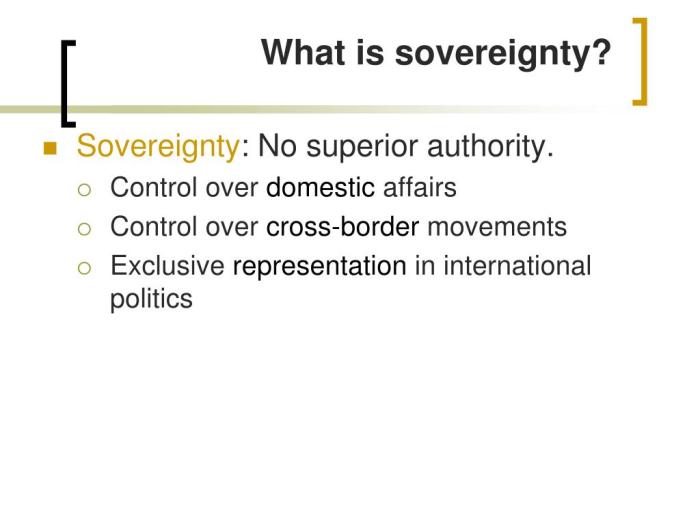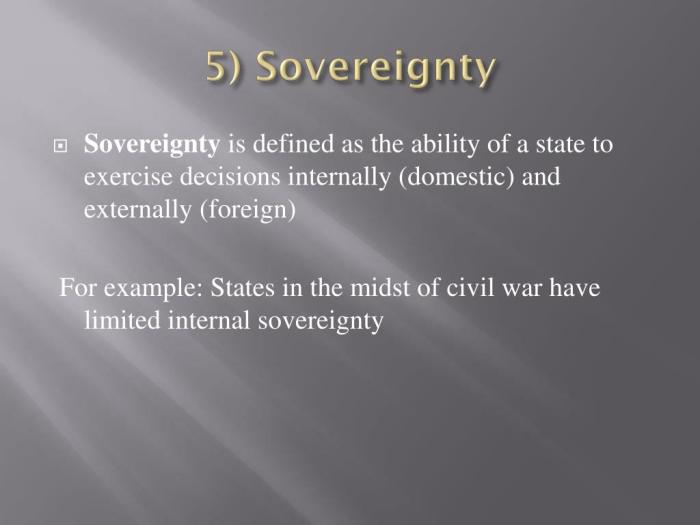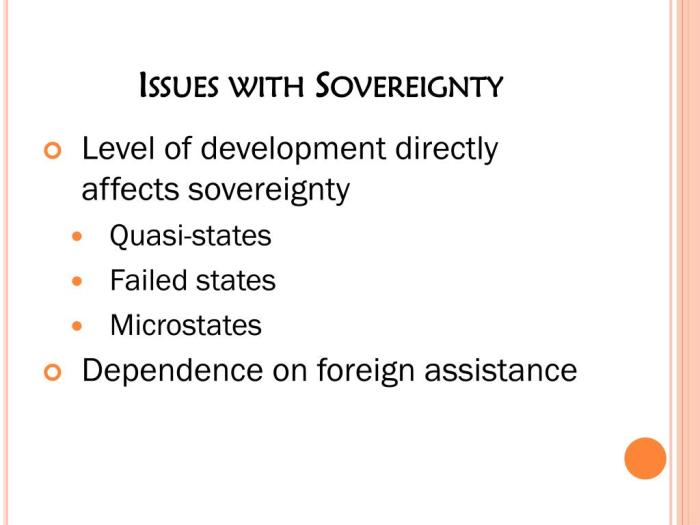How is sovereignty related to devolution – As the topic of how sovereignty relates to devolution takes center stage, this opening passage beckons readers into a world of historical, political, and legal implications, ensuring a reading experience that is both absorbing and distinctly original.
This discourse delves into the intricate relationship between sovereignty, the supreme authority of a nation, and devolution, the transfer of power from a central government to regional or local authorities. Throughout history, the interplay between these concepts has shaped the political landscape of nations, influencing their governance, autonomy, and international standing.
Define Sovereignty and Devolution

Sovereignty refers to the supreme authority of a state over its territory and people. It encompasses the ability to exercise exclusive control over internal and external affairs, including the power to make and enforce laws, regulate economic activity, and maintain diplomatic relations.
Devolution, on the other hand, is the transfer of power and authority from a central government to regional or local authorities. It involves the delegation of certain responsibilities and decision-making powers to lower levels of government, while the central government retains ultimate authority.
Historical Evolution of Sovereignty and Devolution
The concept of sovereignty has evolved over centuries, from ancient notions of absolute monarchical rule to modern ideas of popular sovereignty and democratic governance. The rise of nation-states and the development of international law have further shaped the understanding of sovereignty.
Devolution, as a response to changing political and social conditions, has also undergone significant historical evolution. In the 19th and 20th centuries, many countries adopted devolutionary policies to accommodate growing demands for regional autonomy and self-governance.
Forms and Types of Devolution
There are various forms of devolution, each with its own characteristics and implications. Administrative devolution involves the transfer of administrative responsibilities to local authorities, while fiscal devolution grants local governments the authority to raise and spend their own revenue.
Political devolution goes a step further by empowering local governments with the ability to make laws and policies within their jurisdictions. Examples of countries that have implemented different forms of devolution include the United Kingdom, Spain, and Canada.
Impact of Devolution on Sovereignty: How Is Sovereignty Related To Devolution

Devolution can have a significant impact on the sovereignty of a nation. While it can enhance local autonomy and address regional concerns, it may also lead to tensions between central and local authorities and potentially weaken the overall authority of the central government.
However, carefully designed and implemented devolutionary policies can balance the need for local autonomy with the preservation of national sovereignty. By clearly defining the roles and responsibilities of different levels of government and establishing mechanisms for intergovernmental cooperation, nations can mitigate potential conflicts and maintain the integrity of their sovereignty.
Case Studies of Devolution

There are numerous successful examples of devolution around the world. Scotland, for instance, has implemented a comprehensive devolutionary framework that has granted the Scottish Parliament significant powers over a wide range of policy areas.
Spain’s autonomous communities also enjoy a high degree of autonomy, with their own parliaments and governments responsible for various aspects of governance. These case studies demonstrate the potential of devolution to accommodate regional diversity while maintaining national unity.
Contemporary Issues and Future Prospects
Devolution continues to be a subject of debate and discussion in many countries. Some argue for further devolution to empower local communities and address regional inequalities, while others emphasize the need to maintain a strong central government and preserve national sovereignty.
The future of devolution will likely be shaped by factors such as technological advancements, globalization, and changing political landscapes. As technology facilitates communication and collaboration, it may become easier to accommodate diverse regional interests within a single nation.
However, globalization and increased interconnectedness may also pose challenges to national sovereignty, making it imperative for nations to find innovative ways to balance devolution with the preservation of their core powers and responsibilities.
Question & Answer Hub
What is the primary difference between sovereignty and devolution?
Sovereignty refers to the supreme authority of a state, while devolution involves the transfer of specific powers from a central government to regional or local authorities.
How has the concept of devolution evolved over time?
The concept of devolution has evolved in response to changing political and social conditions, with different forms of devolution emerging throughout history, ranging from administrative to fiscal and political.
What are the potential benefits of devolution?
Devolution can enhance local autonomy, promote economic development, and foster a sense of regional identity and belonging.
What are the potential challenges of devolution?
Devolution can raise concerns about the fragmentation of national sovereignty, the potential for regional inequality, and the need for effective intergovernmental coordination.